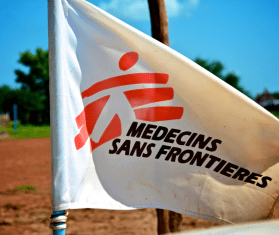NEW YORK/GAZA, April 29, 2024—The physical and mental health of Palestinians is deteriorating rapidly as Gaza’s devastated health care system struggles to keep up with the needs, according to a report released today by the international medical humanitarian organization Doctors Without Borders/Médecins Sans Frontières (MSF). The report documents "Gaza’s silent killings: The destruction of the health care system and the struggle for survival in Rafah".
An Israeli military offensive in Rafah on top of the current humanitarian crisis in Gaza would be an unfathomable catastrophe, said MSF.
More than six months into the war in Gaza, the devastation extends far beyond those killed by Israeli bombardments and airstrikes. Palestinians are facing a massive struggle to access medical care, and a large number of preventable deaths have been caused by disruptions to critical health care services. Factors like attacks on hospitals, shortages of supplies, forced evacuations, and the death and displacement of health care workers have fueled these disruptions.
“How many children have already died of pneumonia in overwhelmed hospitals?” said Mari-Carmen Viñoles, head of MSF’s emergency programs. “How many babies have died because of preventable diseases? How many patients suffering from diabetes are left untreated? What about the deadly consequences of the closure of kidney dialysis units in attacked hospitals? These are the silent killings of Gaza not reported in all this chaos, caused by the collapse of the health care system across Gaza.”
Living conditions in Rafah in particular are not conducive to survival as people are living in inhumane conditions fighting disease outbreaks, malnutrition, and the long-term impact of psychological trauma. There is a desperate shortage of clean water for drinking and bathing while garbage and raw sewage accumulate in the streets. This tiny wedge of land now hosts more than one million people who were forcibly displaced from the north of Gaza and were told this area would be a refuge from the war.
Across just two of the primary health care centers run by MSF in the Al-Shaboura and Al-Mawasi areas, MSF teams are providing an average of 5,000 medical consultations every week, many linked to people’s sub-standard living conditions. The main diseases MSF staff are seeing include upper respiratory tract infections, diarrheal illnesses, and hepatitis A, which is a disease that can spread rapidly when water sources are contaminated. MSF has also seen acute malnutrition emerging at an alarming rate and, between January and March, treated 216 children under five for moderate or severe acute malnutrition. Malnutrition was almost unseen in people in Gaza before this war.
As hospitals are overwhelmed with trauma patients, people with other types of medical needs like pregnant people with complications and those living with chronic diseases are often unable to receive the care they need. At the Emirati Hospital, for example, where MSF is supporting the postpartum department, medical teams struggle to deal with close to 100 deliveries a day. This is five times the number of deliveries per day than before the war. In MSF’s clinics, consultations for hypertension, diabetes, asthma, epilepsy, and cancers have been increasing as patients seek monitoring and medication. However, if their conditions worsen and they require specialized medication or equipment, little can be done as many medical referrals in Gaza are delayed or are simply not possible.
The mental health of Gaza’s population, including medical staff, has also been severely impacted. Most patients arriving at MSF clinics have symptoms related to anxiety, stress, and depression. Some people caring for family members with severe mental health disorders have resorted to excessive sedation to keep them safe and prevent them from harming themselves or others due to the lack of specialized services still functioning in Gaza.
Trying to support Gaza’s devastated health care system has been extremely challenging due to the insecurity. MSF has been targeted more than 20 times since the escalation of conflict in October. MSF has also faced substantial challenges bringing medical supplies and humanitarian aid into Gaza due to delays and restrictions by Israeli authorities. An immediate and sustained ceasefire is critical to prevent more deaths and injuries in Gaza, as well as restore and scale up the flow of humanitarian aid on which people's survival depends.
“As an international emergency medical organization, we have the expertise and the means to do much more and scale up our response,” said Sylvain Groulx, MSF emergency coordinator in Gaza. “Palestinian medical staff are highly skilled and only need to be given the means to work in acceptable and dignified conditions to treat and save lives, but today all this remains absurdly impossible. Without an immediate and sustained ceasefire and the entrance of meaningful humanitarian assistance, we will continue to see more people die."

Gaza's Silent Killings: The Destruction of the Health Care System and the Struggle for Survival in Rafah
Our work in Gaza
MSF currently operates in three hospitals in Gaza: Al-Aqsa Hospital in the Middle Area, Rafah Indonesian Field Hospital, and Emirati Maternity Hospital in Rafah, as well as three health care facilities in Al-Shaboura and Al-Mawasi. MSF medical teams provide surgical support, wound care, physiotherapy, postpartum care, primary health care, vaccinations, and mental health services. MSF is also providing clean water in various locations in Rafah and set up a new desalination plant in Al-Mawasi on March 28.




